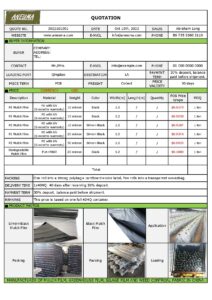Sustainable agriculture, characterized by practices that aim to preserve the environment while efficiently producing food, has gained significant importance in recent years. Among the various tools and techniques available to farmers, mulch film stands out as a valuable contributor to sustainable agriculture. This article explores the role of mulch film in sustainable practices, discussing its types, benefits, and impact on critical aspects of environmentally friendly farming.
II. Mulch Film Types and Benefits
Mulch film comes in various forms, including plastic, biodegradable, and reflective. Each type serves specific purposes in agriculture, such as conserving moisture, suppressing weed growth, and regulating soil temperature. These films offer a range of benefits:
III. Reducing Water Consumption
One of the foremost challenges in sustainable agriculture is efficient water use. Mulch film plays a crucial role in water conservation by reducing evaporation and preventing moisture loss from the soil. Studies have shown that farms employing mulch films can achieve significant reductions in water consumption.
For example, a tomato farm in California reduced its irrigation needs by 20% after implementing mulch film. This not only saves water but also lowers operational costs for farmers, making it a win-win solution.
IV. Weed Control and Reduced Chemical Use
Weed management is another critical aspect of sustainable agriculture. Traditional methods often involve the use of herbicides, which can harm the environment. Mulch film offers a non-chemical alternative by suppressing weed growth naturally. This reduces the need for herbicides and minimizes chemical runoff into nearby water sources.
V. Improved Crop Quality and Yield
Mulch film creates a stable environment for crops by regulating soil temperature and moisture levels. This stability leads to improved crop quality and higher yields. For instance, strawberry growers report larger and sweeter fruits when using mulch film compared to conventional cultivation.
VI. Soil Erosion Prevention
Soil erosion is a significant environmental concern in agriculture. Heavy rains and strong winds can strip away topsoil, degrading farmland. Mulch film acts as a protective barrier, preventing soil erosion and helping to maintain fertile land for future generations.
VII. Sustainable Pest Management
Some mulch films are designed with reflective properties that deter pests. These films create a confusing environment for insects, making it difficult for them to locate and attack crops. As a result, farmers using mulch film often experience a reduced need for pesticides.
VIII. End-of-Season Removal and Recycling
To align with sustainable practices, proper disposal of mulch film is essential. Many modern mulch films are recyclable, and farmers can find recycling facilities to ensure eco-friendly disposal. Recycling not only reduces waste but also conserves resources.
In conclusion, mulch film plays a vital role in sustainable agriculture by conserving water, reducing the need for chemicals, enhancing crop quality and yield, preventing soil erosion, and supporting pest management. Additionally, proper disposal methods contribute to environmentally friendly farming practices. As the global agricultural community continues to embrace sustainability, mulch film remains a valuable tool in achieving these goals.

